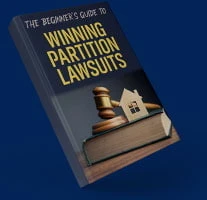Code of Civil Procedure section 872.540 allows certain parties with an oil or gas interest in the property to remain unaffected by the partition lawsuit. This statute is important because it allows particular business arrangements to continue without specific parties needing to expend time and money responding to the partition lawsuit.
Code of Civil Procedure section 872.540 states:
Where property is subject to a lease, community lease, unit agreement, or other pooling arrangement with respect to oil or gas or both, the plaintiff need not join as defendants persons whose only interest in the property is that of a lessee, royalty-owner, lessor-owner of other real property in the community, unit, or pooled area, or working interest owner, or persons claiming under them, and the judgment shall not affect the interests of such persons not joined as defendants.
(Amended by Stats. 1976, c. 73, p. 110, § 6.)
“Shawn” and “Julie” are an unmarried couple who decide to get into business together. Shawn and Julie find several acres of land and buy it together as an investment. They each own a one-half ownership interest in the land.
Shawn and Julie quickly discover that some of their land contains natural gas reserves. They agree to a lease with a local gas company to make some money from their investment. The gas company’s only interest in the property is as a lessee.
Eventually, Shawn and Julie’s relationship deteriorates, and the couple breaks up. Julie wants to sell the land and move on with her life, so she sues Shawn for partition.
Here, under CCP § 872.540, Julie does not need to join the gas company as a defendant in her complaint. The gas company is a lessee and meets the requirements in the statute to be excluded from the complaint. The gas company can continue to operate without fear of responding to Julie’s lawsuit. Additionally, any partition judgment will not affect the gas company’s interest in the property.
1976 Addition
Section 872.540 continues the substance of former Section 753.1.
Section 872.540 is another partition statute without an official comment from the Legislature. But this is because the Legislature essentially endorsed an overall adoption of the Law Revision Commission suggestions when it passed the new partition statutes in 1976.
Indeed, the introduction to Assembly Bill 1671 (the bill that contained the new partition laws) states that the Revision Commission’s recommendations “reflect the intent of the Assembly Committee… in approving the various provisions of Assembly Bill 1671.” Thus, it’s fair to assume that the Legislature’s intent with Section 872.520 was substantially in line with that of the Law Revision Commission.
As to how this statute functions, litigants should be careful not to assume that the statute exempts the naming of lessees in partition actions. The exception within section 872.540 states that it applies “with respect to oil or gas or both.”
Exceptions in a statute are to be strictly construed. (National City v. Fritz (1949) 33 Cal.2d 635, 636.) And in interpreting exceptions to a general statute courts include only those circumstances which are within the words and reason of the exception. (Barnes v. Chamberlain (1983) 147 Cal.App.3d 762, 767.)
As such, had the Legislature intended the exception to apply to all leases, they would have actually said as much. (Regency Outdoor Advertising, Inc. v. City Council of Los Angeles (2006) 39 Cal.4th 507, 529-530.)
This was actually an argument proposed in an unpublished case out of the Sixth District Court of Appeal back in 2016. Titled Loubar, LLC v. U.S. Bank, N.A., there, the Plaintiff filed a complaint for partition but failed to name the bank as a defendant because it held only a leasehold lien. The appellate court expressly disagreed with this interpretation of the statute, holding section 872.540’s exceptions applied only to oil and gas leases.

